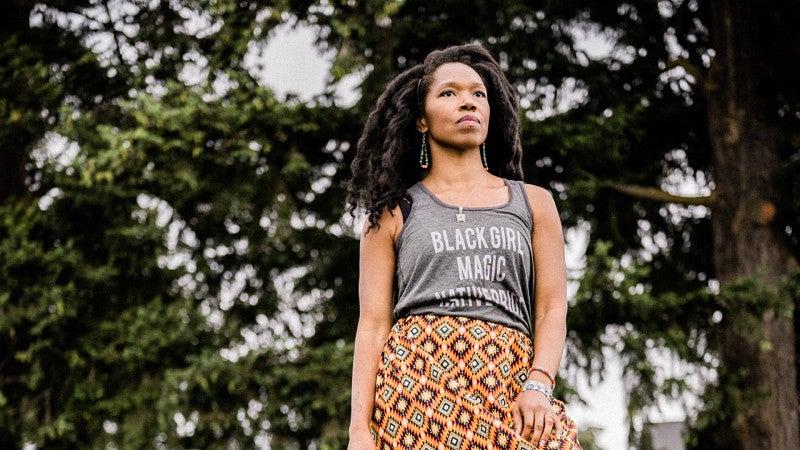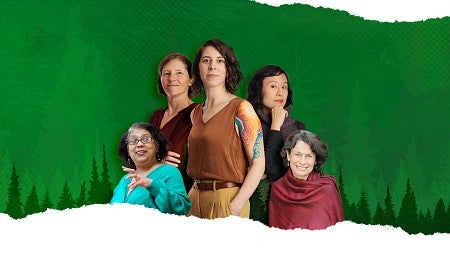
Amber Starks, Common Reading and Technologies of Resistance
Pairing up with the Common Reading program, an alumna helps the UO explore Indigenous and Black concerns
By Matt Cooper • Photo by Josué Rivas • July 7, 2021
3 min readAs a citizen of the Muscogee (Creek) Nation of Oklahoma and a Black American, 2003 alumna Amber Starks is immersed in issues important to many Native Americans and African Americans.
She has devoted her life to sovereignty for Indigenous nations and liberation for Black people. She believes partnerships between Black and Indigenous peoples—and all people of color—can dismantle the beliefs that drive anti-Blackness and white supremacy and redress the damage wrought by settler colonialism globally.
Now she’s helping the University of Oregon examine these issues.
Under a grant from the UO Savage Endowment for International Relations and Peace, Starks is in residence through 2022—virtually as necessary—with the UO Common Reading program. The Portland resident is working with stakeholders to explore intersections of Indigenous and Black concerns through the Common Reading selections This Is My America, by Kimberly Johnson, BS ’01 (ethnic studies), vice provost for the Undergraduate Education and Student Success division (UESS); The 1619 Project podcast, by Nikole Hannah-Jones of the New York Times magazine; and Braiding Sweetgrass: Indigenous Wisdom, Scientific Knowledge, and the Teachings of Plants, by Robin Wall Kimmerer.
Starks, who earned a bachelor’s degree in general science, is ferreting out common threads of the works for university-wide conversations, academic collaborations, and other exercises to better appreciate Black, Indigenous, Afro-Indigenous, and related racial identities.
Says Starks: “I hope to contribute to the ongoing conversations within and across the Black and Native communities around decentering white supremacy and settler colonialism”—the ongoing replacement of Indigenous populations by an invasive settler society.
“Hopefully, in doing so,” she adds, “we can fully realize that our movements for Black liberation and Indigenous sovereignty are parallel technologies of resistance. They are interconnected. They are compatible. And without romanticizing our complex histories, hopefully we can acknowledge the ways our peoples have managed to build community and invest in kinship modalities with one another despite the oppression we’ve both endured under the US project.”
An activist, model, and owner of Portland-based Conscious Coils salon, Starks drew broad media attention in 2013 while leading a legislative effort that legalized the work of natural hair stylists, whose use of braids, twists, and other styles is a cultural tradition among Africans and African Americans. She has worked with the Urban League of Portland, a Black civil rights organization that supported her legislative campaign, and has led racial-awareness activities through the Native Arts and Cultures Foundation of Washington, Seattle’s Indigenous People Festival, and the Center for Race and Gender at University of California, Berkeley, among others.
Julie Voelker-Morris, director of UO Common Reading, a program of UESS, says Starks is essential to Common Reading’s goal of building community, enriching curriculum, and engaging research through the shared experience of important literary works.
“Amber Starks is a living embodiment of the UO Division of Equity and Inclusion’s LACE model,” she says. “She absolutely leads with ‘love, authenticity, courage, and empathy.’”
Professor Kirby Brown, director of Native American and Indigenous Studies at the UO and a partner with Common Reading, says Starks will help the UO community to better understand the Kalapuya people, the Indigenous nation on whose traditional land in the Willamette Valley—called Kalapuya Ilihi—the university is located.
“Situated at the intersections of Indigenous and Black history and experience, Amber’s art and activism importantly center, celebrate, and affirm those relationships,” Brown says. “At the same time, her work challenges us to reckon with the complicated histories, relationships to place, and responsibilities to each other and to the Indigenous peoples, lands, and other-than-human relations that have long called—and continue to call—Kalapuya Ilihi home.”
Matt Cooper is managing editor for Oregon Quarterly.




